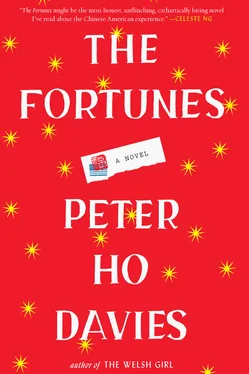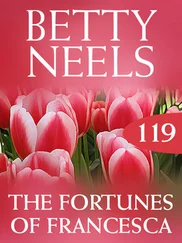Eventually he found himself back in San Francisco at the very dock he’d arrived on twenty years earlier, delivering the last remains in his charge and deliberating whether it was time to follow them home. The Exclusion Act, barring further Chinese immigration, had finally been passed (the last in a long line of anti-Chinese laws dating back to a ban on carry poles). No more Chinamen. No more women for those already there.
At the foot of the gangway, an old tar, so leathery his race was indeterminate, asked him if the bones were bound for doctors in China. “I ’member when we used to ship ’em up from Panama, bodies of them what died of yellow fever building that there railroad ’cross the isthmus, skeletons for the medical gentlemen, even some poor devils pickled in barrels for surgeons to practice on. That railroad, they say, was paid for by the fees for those bodies.”
“I wouldn’t be a bit surprised,” Ling said mildly. He remembered Crocker’s spluttering indignation when the Panama Railroad — all forty-eight miles of it! — had been referred to in his hearing as the first transcontinental.
So had he seen the elephant at last? Ling asked himself a little later, lighting his pipe, staring out over the expanse of the bay, the water gray and wrinkled with chop.
By then he’d learned the expression, before it was adopted by miners, had originated with troopers on their way to the front. “Going to see the elephant,” meaning the great gray army of the Confederacy. That war had almost torn the country in two, but the railroad, men said, had bound it back together, the tracks and ties like sutures to a wound, now fading to a scar.
Or perhaps just stitches to mend a rip, Ling thought. If he’d once been proud and later ashamed, he’d now grown bitter. The railroad finished, the Chinese had scattered across the West, thousands of them looking for work and willing to do it for less than most ghosts. That plus the influx of new labor from the East, over the very tracks the Chinese had laid, had made competition for jobs even fiercer and resentment among the ghosts more pronounced. This was the season of the sandlot riots, of The Chinese Must Go! The Chinese might have physically united the country by building a railroad across it, but now they were uniting it in another sense, binding the quarreling tribes of Irish and English, French and Germans, Swedes and Italians together against a common enemy.
We made them white, Ling thought. Just like Uncle Ng said. Just like bluing. Whiter than any laundry.
The Chinese were singled out for their race, their peculiar ways — blacks came in for the same treatment, of course, but the country had almost come asunder fighting over Negroes, and the Chinese, for the time at least, seemed an altogether simpler target — but also because, unique among all immigrants, they were the ones who looked to leave, to take their wealth home with them. It offended settlers, this sojourner attitude, exemplified by the very bones Ling helped to send back to China.
And now he might go aboard one of those ships as a passenger himself. He had enough saved to buy a ticket home, and he had certainly come to envy the peace of the men in his care, their silence, their stillness, their eventual homecoming. He was old, even Gold Mountain was old; Australia was the new Gum Shan. And yet… there was still the matter of the elephant.
A part of him, younger and more innocent, still hoped the phrase might refer to a real elephant; circuses were all the rage then, after all. He’d heard of Jumbo, the star attraction, made famous in part by the railroads, which allowed him to be shipped from city to city, traveling as the papers said in a palace car of his very own. It made Ling smile to picture it — the elephant reposing like Mister Charley, the man’s voluminous beard grown into a flowing trunk — and he yearned to see the beast, but the nearest he’d come was being passed once, somewhere in Nevada, by a circus train, a giraffe’s great neck stretching above the treetops, its tiny ears pinned back in the wind. They’d better have it lie down before the Sierra tunnels, he thought. He could hear the roaring of lions, the chatter of monkeys, and, he fancied, the bellow of an elephant over the engine. He found himself waving at the train like any child.
But lately he’d read that the famous pachyderm had been killed, struck and crushed by a train, of all things. All that was left was its skeleton, on display in a museum in Washington, and he’d seen enough bones. In another paper he’d learned of the death of the Bunker twins, Chang and Eng, their bones buried in North Carolina but their shared liver pickled and on show in a museum back East.
Now on the docks what came to mind at last was the old Chinese fable of the blind men and the elephant. How one flapped its ear and said it was like a fan, and another grasped its tail and said it was like a snake, a third rubbed its trunk and proclaimed it like bamboo. And so on and so forth. It’s how he felt about his life, about Gold Mountain, like one of those blind men finding an elephant but not knowing what he held.
And yet, looking out across the roadstead to the famous gap of the Golden Gate, Ling resisted being driven out. If what distinguished the Chinese from the rest was that they didn’t mean to stay, well then, some of them must stay, and why shouldn’t he be one? Him and all the whores, he thought, summoning up Little Sister for the first time in years. They couldn’t go home for shame, but if he did, he’d still be Tanka or Eurasian, the stains he’d hoped to wash away with wealth. On Gold Mountain, at least, they were all simply Chinese.
It reminded him of a dirty version of the old story told to him by a whore — maybe Little Sister herself, though after so much time and so many whores he couldn’t be sure. He’d met her again, years later, alive and well, if more ample than before, madam of her own establishment, albeit one in a dusty backwater he passed through on one of his bone-gathering trips.
He hadn’t known her at first. She was in a Western dress, dark watered silk and flounced crinoline — very seemly, if a little dated. He recalled Mrs. Crocker in similar styles, and when the woman called him by name he’d had the odd thought at first that it was her, his former mistress. And then he’d recognized Little Sister’s wanton grin.
“Well, if I ain’t seen the elephant!” she’d exclaimed. He’d been tempted to turn on his heel, look behind him. She meant him, of course, and yet he wanted to deny it, as if it were an accusation. She held him at arm’s length to study him — he could feel the dirt under his nails, in the seams of his clothes and flesh — and then embraced him, and even though he knew she pitied him, it felt as if she’d lifted a yoke from his shoulders.
She was calling herself Madame Celeste these days and partnered with a robust old highbinder who went by the name of Sam Gum — a play on Gum Shan — though whether he had chosen the name or had it bestowed upon him, Ling never knew. He reveled in it, though, styling himself Missa Gold in expansive moods, though he was certainly called other names by those he beat at the poker table in the corner of the brothel. He reveled in those too, though as if they were so many laurels, going so far in latter days, after the fame of Bret Harte’s poem “The Heathen Chinee,” about a couple of whites gulled by a Chinese gambler, as to call his place the Heathen Café. The poem’s fame, despite the dim light in which it showed his kind, brought him customers by the bushel, though he was sure to sit down to the table in only a vest, his arms bare to the shoulders, so no man could accuse him of cheating like the Chink in the poem, the cards secreted in the folds of his voluminous sleeves.
Читать дальше












